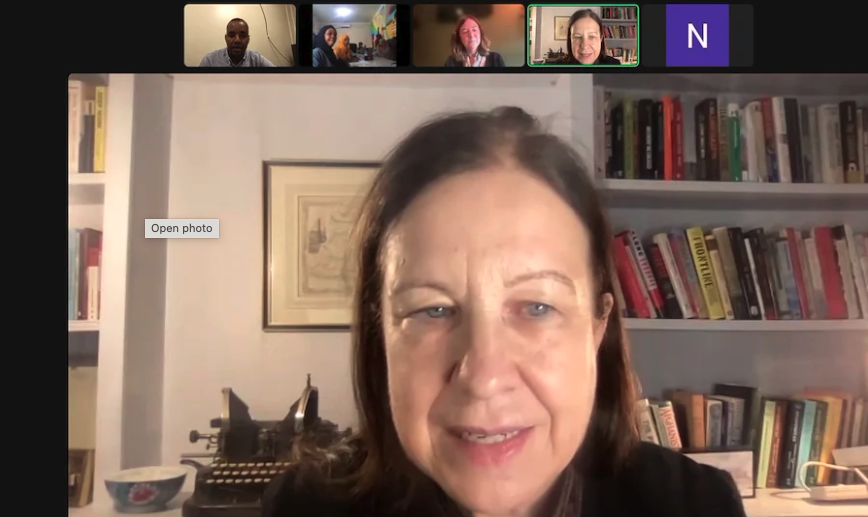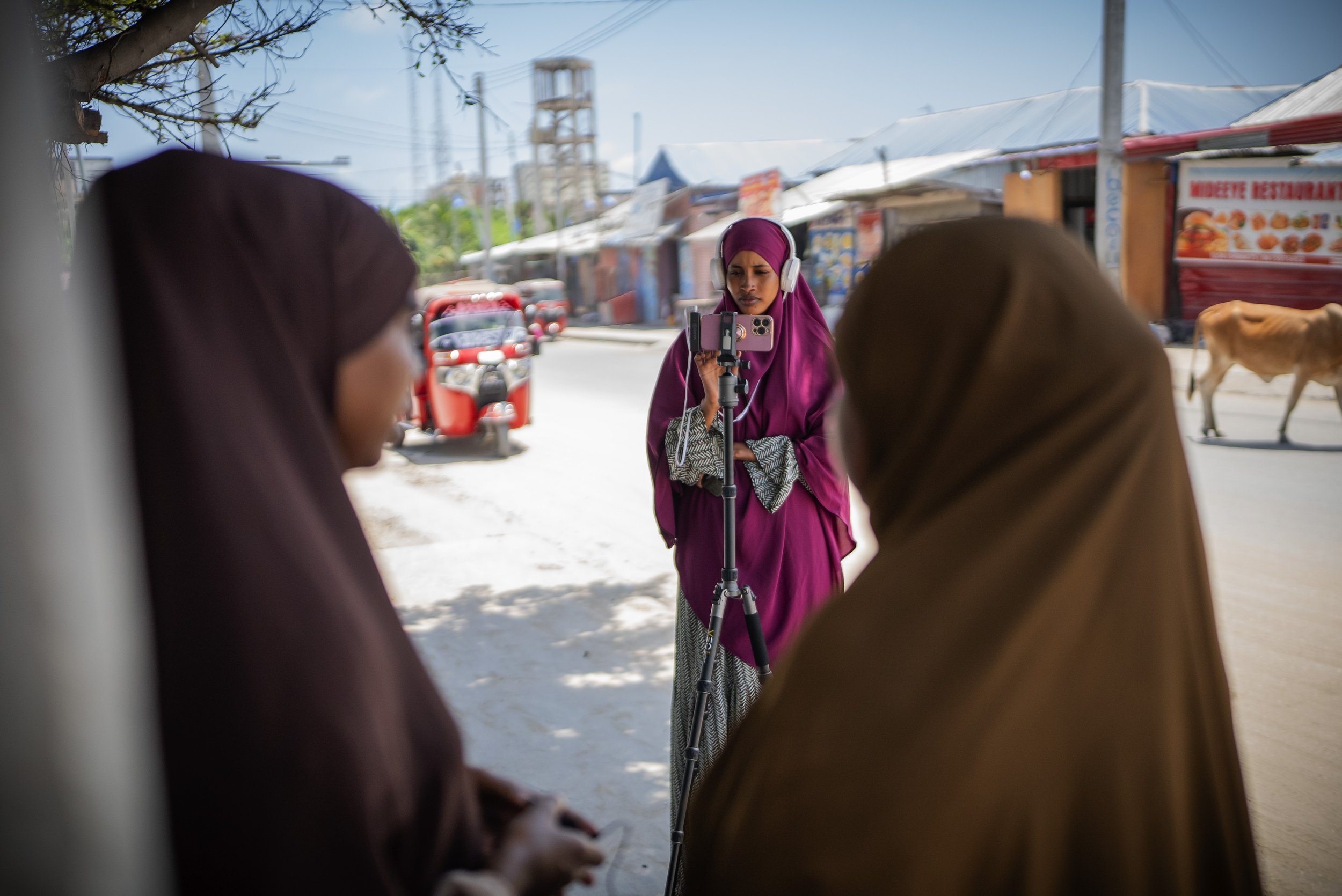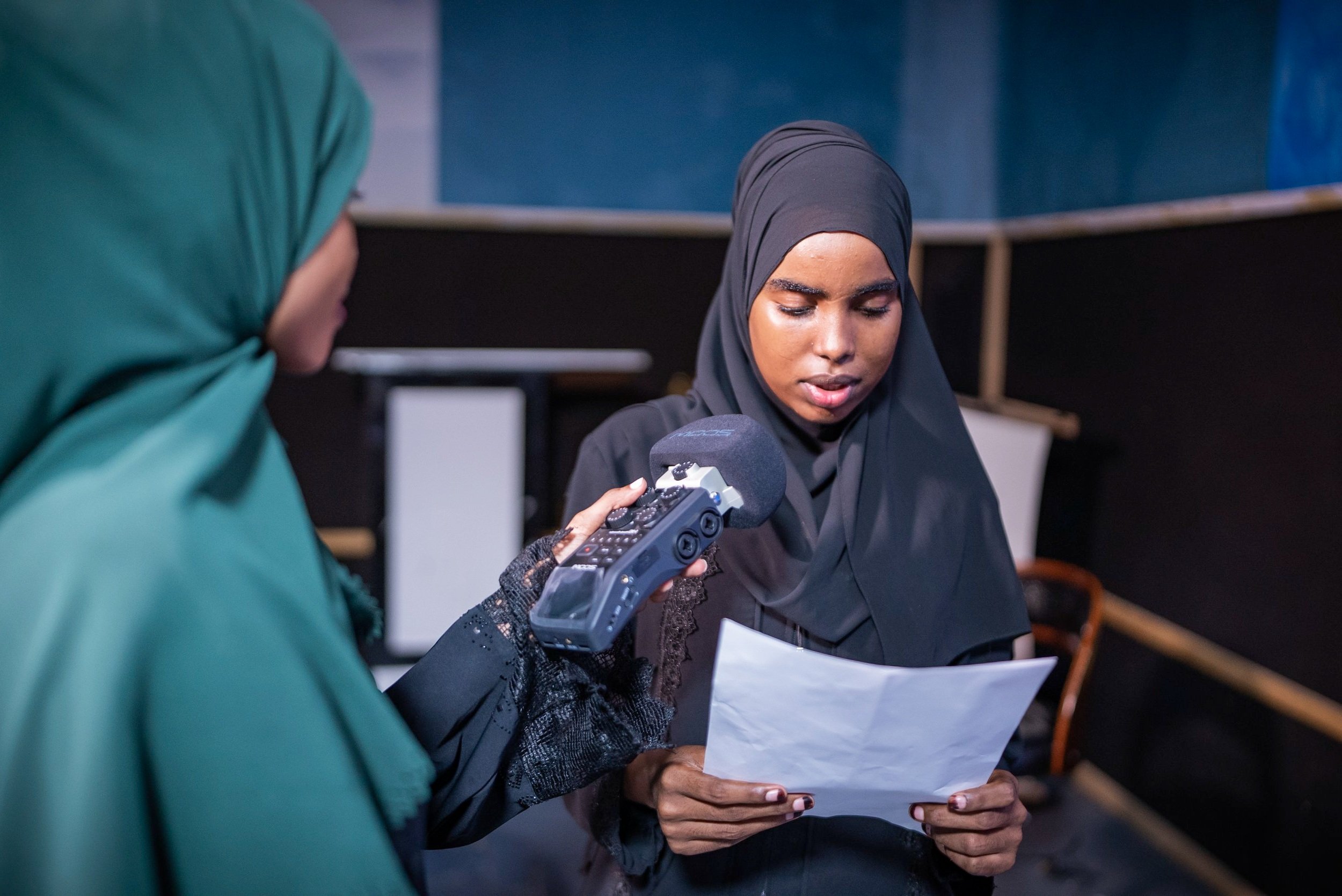Lyse Doucet masterclass caps 6 amazing months for Bilan
Bilan advisor, Mary Harper, reflects on the stellar rise of Somalia’s first all-women media team
It is apt that Somalia’s only all-women media house, Bilan, marked its six-month anniversary with a masterclass from one of the world’s most eminent female journalists, the BBC’s Chief International Correspondent Lyse Doucet.
It is difficult to say who was more excited, Lyse or Bilan.
One thing I can say for sure is that they both loved it. The class went way beyond its allotted time as Lyse shared her wisdom on reporting, safety, teamwork and the unique challenges and opportunities of being a female journalist.
Bilan’s questions and comments were feisty. The women on the team might be young – none of them is over 30 – and relatively inexperienced, but they are confident and brave.
They have to be.
Somalia is one of the world’s most dangerous places to be a journalist. Female media workers face additional threats including physical, sexual and psychological abuse, and prejudice from close family members and the wider society.
Lyse is the latest in a long line of distinguished international journalists to give their precious time to Bilan. They include ITV’s Rageh Omaar, Channel 4’s Lindsey Hilsum, Abdi Latif Dahir of the New York Times and Mishal Husain who presents the BBC’s flagship Today and News at Six programmes.
They have all spoken about what a privilege it is to have been invited into Bilan’s world.
I feel the same.
Mentoring Bilan from day one and watching them develop in a few short months into a crack team of reporters filing for local and international media has been one of the most satisfying and enjoyable things I have done during my three decades of journalism.
The Bilan team are part of a new breed of Mobile Journalists or Mojos which means they do most of their work on mobile phones, including filming, audio recording, editing, scriptwriting and live broadcasting. One of their most useful masterclasses was with the BBC’s pioneering Mojo, Anna Holligan, who gave feedback on some of their early reports and shared clever tips on how to improve them.
Using the phone as a central tool of journalism is ideal in a dangerous environment like Somalia as it is less intrusive, reduces visibility and is easier to carry, enabling reporters to escape rapidly during attacks.
The six Bilan journalists do all of their own work, from start to finish. They come up with the story ideas, decide how to tell them, film and record everything themselves, write the scripts, and present and edit the reports. They are reporters, producers, camerawomen, sound engineers, picture editors and presenters, all in one. Some of these skills were completely new to them when they joined the team.
One area of Bilan’s work that requires no improvement is its creativity in finding stories. Every week the journalists come up with original and important ideas of interest to all Somalis and the world beyond.
Using the phone as a central tool of journalism is ideal in a dangerous environment like Somalia as it is less intrusive, reduces visibility and is easier to carry, enabling reporters to escape rapidly during attacks.
The six Bilan journalists do all of their own work, from start to finish. They come up with the story ideas, decide how to tell them, film and record everything themselves, write the scripts, and present and edit the reports. They are reporters, producers, camerawomen, sound engineers, picture editors and presenters, all in one. Some of these skills were completely new to them when they joined the team.
One area of Bilan’s work that requires no improvement is its creativity in finding stories. Every week the journalists come up with original and important ideas of interest to all Somalis and the world beyond.
They have reported on women drug addicts in Mogadishu, young urban women who study agriculture and travel to rural areas to farm and have persuaded people living with HIV to speak to them, helping to break down taboos.
It is not surprising that the BBC, The Guardian, El Pais and other major international news outlets are commissioning regular reports from Bilan. No wonder their stories have reached millions in Somalia, with individual reports viewed more than a quarter-of-a-million times.
The journalists have travelled to Egypt to report from COP 27, they have gone to different parts of Somalia to cover the drought for The Guardian. Some of their work has moved people so much that they have donated money to help those in need. The health ministry has intervened to assist people living with HIV.
A powerful part of Lyse’s masterclass was her focus on teamwork. Bilan has been exemplary in this regard.
The team is made up of journalists from different parts of Somalia. They all support and encourage each other, including the two interns who work with them twice a week.
The youngest Bilan journalist is Shukri Mohamed Abdi who left home for the first time to join the team in Mogadishu. She comes from South West State, where she faced prejudice and threats from her clan and beyond. She has flourished, reporting on a Society for Divorced Women in Baidoa and a somewhat intimidating 10-year-old girl who teaches crafts to adults in Mogadishu.
Bilan has provided a safe space, regular income and a real opportunity for the women who work there. It has enabled Naciima Saed Salah to realise her dream of becoming a journalist.
So determined was she to work in media that she travelled all over Somalia and Kenya to hunt for work. The jobs she found in journalism were poorly paid or not at all. For a time, she worked as a hotel cleaner and a street food seller in Nairobi in order to survive.
Bilan has changed her life and is enabling her and her colleagues to open up a whole new world of stories about Somalia for local and global audiences.


